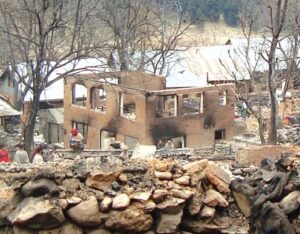
Going the Israeli way
Muntaha Kirmani
After the 22 April Pahalgam attack, Indian military has gone berserk in the valley. Over a dozen houses belonging to the family members of active and former armed resistance fighters were razed to rubble using high explosive devices.
It is no longer metaphorical to say that Kashmir is becoming another Palestine. It is literal now. The playbook is the same, the methods identical and the ideology is chillingly familiar. The occupier doesn’t even pretend anymore.
The high intensity blasts, demolition squads, spectacle of destruction carried out in broad daylight is the textbook Zionism exported to the Himalayas. Ironically enough, Israel calls it “deterrence,” while fascist state of India calls it “fight against terrorism”. But the victims call it what it is: punishment for existing.
This tactic of targeting families, destroying homes and making grief a generational inheritance is pulled straight from the Israeli arsenal of occupation. If you cannot kill the rebel, you destroy the roots that gave him birth, bury his memories under concrete and fire and teach the village what it means to dream of freedom under the shadow of a state that considers your very breath seditious.
The Indian state today mirrors Israel in military choreography and civilizational arrogance. Kashmiris, like Palestinians, are being suppressed, erased, fragmented, and rewritten into silence. The land is being weaponized. Laws are changed overnight. Settlements are being planned with sinister precision. Bureaucrats now sit as viceroys who engineer demographic shifts under the pretense of “development.” In Jerusalem, they call it Judaization and in Srinagar, it is Hinduisation. Both are soaked in the same ideological ink of the myth of divine entitlement, the claim of ancient sovereignty and the language of sacred conquest.
They demolish homes in Kashmir the same way they do in Gaza to crush the spirit of people and to flatten resistance. To remind every child born under occupation that their life is conditional, precarious, and surveilled. This is how you strengthen the chains of occupation by seizing land, turning memory into rubble, homes into warnings, and grief into a permanent national identity.
Nevertheless, Kashmir stands. Crushed but unbowed. Wounded but never silenced. Because like Palestine, Kashmir has learned how to turn ruins into resistance, loss into literature, and memory into a weapon that no bulldozer can flatten and no explosive material can blow up. The occupier may borrow Israeli tactics, may mimic their brutality, but they will inherit their failures too. Because no settler project, no matter how ruthless, can outlast a people who have named their graves after freedom.
There is a reason India looks to Israel. Both are haunted by the same fear that history will one day speak in the voice of the occupied. And when it does, no amount of rubble, barbed wire, or bulldozers will be enough to drown it out.



